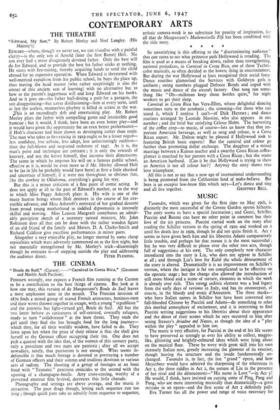CONTEMPORARY ARTS
THE THEATRE
"Edward, My Son." By Robert Morley and Noel Langley. (His Majesty's) F_DwAan—whom, though we never see, we can visualise with a painful clarity—is the only son of Arnold (later the first Baron) Holt. No son ever had a more disntrously devoted father. Only the best will do for Edward, and to provide the best his father sticks at nothing. He starts with fire-raising, thereby acquiring funds to send the child abroad for an expensive operation. When Edward is threatened with well-merited expulsion from his public school, he buys the place up, thus leaving the head master (who rather surprisingly is also the owner of this ancient seat of learning) with no alternative but to bow to the parent's juggernaut will and keep Edward on his books. And so it goes on—the father bull-dozing a path for a paragon, the son disappointing—but never disillusioning—him at every term, until at last the useless, mannerless playboy is killed in action in the war.
his is an exceedingly deft and entertaining play. Mr. Robert Morley plays the father with compelling gusto and irresistible good humour ; but it would, I think, have been an even better play—and it would have given the opportunity for an even better performance— if Holt's character had been shown as developing rather than static. The man who takes to fire-raising in 1919 ought to be a lesser rogue— less confident, less urbane, less adept, less unhesitatingly ruthless— than the full-blown and respected racketeer of 1947. As it is, the man's poise and technique are constant ; it is only the rewards of knavery, and not the knave himself, that increase their dimensions. The scene in which he imposes his will on a famous public school, effective as it is, would be even more so if Mr. Morley allowed Holt to be (as in life he probably would have been) at first a little abashed and uncertain of himself, if it were not throughout so obvious :hat, like the cowboy in Oklahoma, everything's going his way.
But this is a minor criticism of a fine piece of comic acting. It does not apply at all to the part of Edward's mother, or to the way in which Miss Peggy Ashcroft plays it. His wife is one of the many human beings whom Holt destroys in the course of his irre- sistible advance, and Miss Ashcroft's portrayal of her gradual descent from proud young motherhood to raddled dipsomania is intensely skilful and moving. Miss Leueen Macgrath contributes an admir- ably percipient sketch of a secretary turned mistress, Mr. John Robinson does all that can be done with the rather wooden figure of an old friend of the family and Messrs. D. A. Clarke-Smith and Richard Caldicot give excellent performances in minor parts.
Altogether a very enjoyable play, no longer marred by some cheap topicalities which were adversely commented on at the first night, but not materially strengthened by Mr. Morley's trick—disarmingly though he executes it—of stepping outside the play and addressing


































 Previous page
Previous page